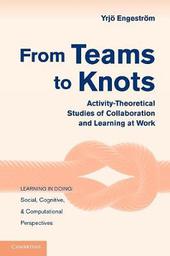
|
From Teams to Knots: Activity-Theoretical Studies of Collaboration and Learning at Work
Paperback / softback
Main Details
Description
Teams are commonly celebrated as efficient and humane ways of organizing work and learning. By means of a series of in-depth case studies of teams in the United States and Finland over a time span of more than 10 years, this book shows that teams are not a universal and ahistorical form of collaboration. Teams are best understood in their specific activity contexts and embedded in historical development of work. Today, static teams are increasingly replaced by forms of fluid knotworking around runaway objects that require and generate new forms of expansive learning and distributed agency. This book develops a set of conceptual tools for analysis and design of transformations in collaborative work and learning.
Author Biography
Yrjoe Engestroem earned his Ph.D. from the University of Helsinki in 1987. He is a Professor of Adult Education and Director of the Center for Research on Activity, Development and Learning (CRADLE) at the University of Helsinki. He is Professor Emeritus of Communication at the University of California, San Diego, where he also served as Director of the Laboratory of Comparative Human Cognition from 1990 to 1995. Engestroem applies and develops cultural-historical activity theory as a framework for the study of transformations and learning processes in work activities and organizations. He is widely known for his theory of expansive learning and for the methodology of developmental work research.
Reviews'... rich in data and conceptual analysis ... admirable scholarship ...' Mike Bonner, PsycCRITIQUES 'Yrjoe Engestroem has produced the kind of scholarly synthesis of research on teamwork in organizational settings that social scientists have been waiting for ever since the appearance of his classic prolegomenon, 'Learning by Expanding'. It is both comprehensive in its critical and illuminating treatment of competing lines of research and theory, clear and compelling in its treatment of the work of his research team, and stimulating in its thoughts about the future of work.' Michael Cole, University of California, San Diego
|